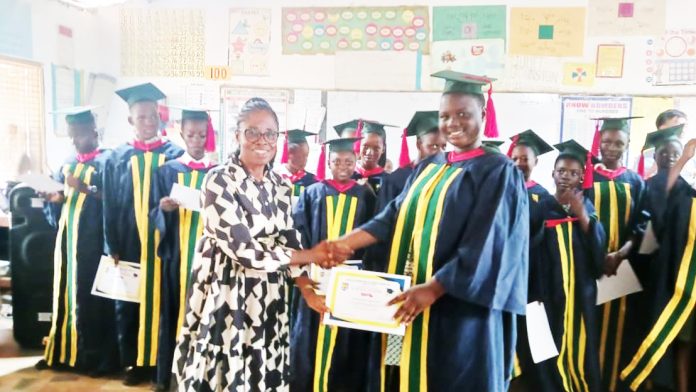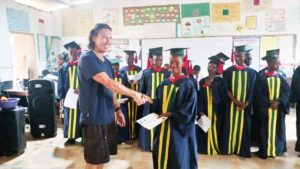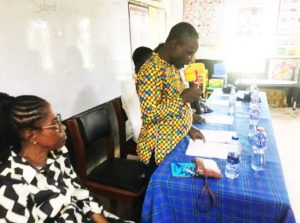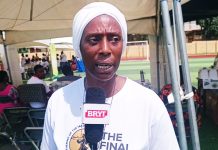
Juliet Johnston School Complex, an Akyem-Tafo-based private school in the Eastern Region, has held its second graduation ceremony for kindergarten (KG2) to junior high school (JHS) in grand style.
The school, which started as a UK-registered charity with Ghanaian Non-Governmental Organisation (NGO) status through the reinvestment of all surplus income, graduated 55 children, made up of 27 KG2 pupils to Basic 1 and 22 Basic 6 pupils to JHS 1.
Individuals including Sarfo Emmanuel Annor, a visual artist, Mr. Kentaro Taguchi, SPIRARE Project in Japan, Mr. Fabio Caselli from Switzerland, parents, chiefs and clergy greeted the occasion.
The colourful display of sheer rich cultural performances and traditional dances, choreography, poetry recitals and a dramatic presentation on teenage pregnancy by the students brought mixed feelings among the gatherings.

These performances highlighted the diverse talents of the pupils and provided a vibrant showcase of the school’s commitment to holistic education, which places great emphasis on individual and small group tuition so that each child has the opportunity to reach their maximum potential.
Addressing parents and school children at the ceremony, Madam Juliet Gladys Osafo, co-proprietress of the school, expressed gratitude to her co-proprietress, Mrs. Fiona Basil Johnston, and her husband, Mr. Eric Johnston, based in the United Kingdom, for their contributions to the school’s development.
Additionally, she extended heartfelt thanks to Mrs. Keri Reid and her team from Muthill State School in Scotland for conducting in-service training for the teachers, enhancing the quality of education at Juliet Johnston.
Madam Juliet Gladys Osafo, co-proprietress of the Juliet Johnston School Complex, indicated that the graduation ceremony not only celebrated academic achievements but also reinforced the collaborative spirit among the school community, setting a positive tone for the students’ future endeavours.
According to her, the school curriculum is based on the national Ghanaian curriculum, complemented by the British curriculum, including computing and French from KG1 and Information and Communication Technology (ICT) from Basic 1, among others.
The co-proprietress of the school hinted that in the quest to place emphasis on individual and small group tuition so that each child has the opportunity to reach their maximum potential, the school uses two teachers in each preschool class.
She mentioned that the school has made a deliberate effort to ensure that a school child is fully conversant in English, thereby facilitating the learning of basic reading, writing and number work. The school teaches English phonetically as well as by key word recognition.
Buttressing her argument, Madam Juliet stated that research shows that children learn in a variety of ways, often more readily absorbing information when it is presented ‘actively,’ not just on the whiteboard; hence the school teaches jolly phonics (adapted for Ghana), which is a physical activity.
To make teaching and learning easier and more entertaining, the school is fully equipped with educational toys, games and equipment and uses videos and television for class presentations since research shows that watching videos and television programmes in the target language greatly increases spoken language learning.
She continued that the school has a modern, fully equipped library with varieties of books since books are key to English language learning through speaking, reading, and writing.
“The school’s partnership with other schools in Scotland has created an environment for an exchange programme among teachers of the school and their counterparts in Scotland, a step that has hugely impacted the teaching and learning culture of the school,” she disclosed.

The co-proprietress of the school further boasted that the school’s healthy mutual educational relationship with experts from British teachers who run in-service teacher training programmes for the teachers gives her school some competitive advantage.
The school offers scholarships to brilliant but needy children from pre-school to the tertiary level, as well as teachers to pursue higher levels of education in a quest to prepare them for quality teaching and learning.
She advised the pupils to maintain good behaviour both in and out of school and to prioritize their education for the socio-economic betterment of the country and thanked the teaching and non-teaching staff, management team, Parent Teacher Association (PTA) and all partners for their various contributions to the school’s growth.
On his part, the headmaster of the school, Mr. Twum Richard, urged parents to actively support their children’s education, emphasising the school’s dedication to providing quality education.
He announced that foreign scholarships would be available for pupils who excel in their exams, encouraging parents to help sustain the graduation ceremony tradition to inspire and motivate the students.








